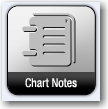Patient Chart
The Patient Chart is the central repository of clinical
information for the patient.
Introduction
to the Patient Chart
Image Viewer
Introduction to the
Patient Chart
The Patient Chart contains important information regarding the patient.
This information can typically be viewed by visit, by MPI, or both. The
Patient Chart contains the following areas of functionality, each with
their own button on the Hospital main page. These areas can also be accessed
using the tabs from any of the Patient Chart pages:

|
Social Profile |
The
Social Profile page is used to view the patient's social, occupational,
and environmental history. There are multiple sections of patient
data. |

|
Vitals |
Contains
vital sign data for the patient. Vital signs can be entered, edited,
and graphed from this page. |

|
Assessments |
Contains
clinical body system assessment documentation for the patient.
Options on this page include adding, viewing, editing, and comparing
clinical assessments. |

|
Chart
Notes (or
Notes) |
Contains
clinical progress notes. Options on this page include adding,
viewing, and editing. |

|
Clinical
Summary |
Provides
a quick view of patient information for the current day. You can
view and/or print a summary of the patient information, including
Intake/Output values, Vitals, recent Lab Results, and recent Medication
Orders. |

|
I/O |
Contains
intake and output data for the patient. Intake and Output values
can be viewed, entered, and edited from this page. |

|
Lab
Results |
Contains
lab result documentation, where lab results can be viewed and
graphed. |

|
Documents |
Contains
patient education, transcribed, radiology result, and scanned
documents. Options on this page include viewing, editing, and
printing. |

|
Orders
Tracking |
Contains
a list of existing orders (active and inactive) and their status.
Information on this page includes order and administration details,
frequency, conflicts, and start and completion date and time.
Orders can be filtered by department and verified from this page. |

|
Plan
of Care |
Contains
a list of suggested and existing care plans for the patient. |

|
Medical
Summary |
The
Medical Summary page is used to view, create, and upload/import,
and export electronically generated medical summaries for the
patient. From this tab, you can view, upload, download, and prepare
and generate the Medical Summary. In addition, from this page,
you can perform Clinical Reconciliation between imported documents
and the patient's current record for Medications, Medication Allergies,
and Problems.
|
To access these areas of the Patient Chart, use one of the following
methods:
(Preferred method) From the main page, click Select to display the patient Visit
Search box. Begin typing the patient's information (last name, SSN#,
or D.O.B) in the blank field. See Selecting
Patients for additional information about using this feature.
Once you select the appropriate patient, the available visits are
displayed. Select the appropriate visit by clicking it. Then, click
Select. The patient's name,
medical record number (MR#), visit #, and attending doctor are displayed
at the top of the main page. Then, click the desired function button.
The selected page is displayed with the appropriate patient information
displayed in the yellow bar at the top of the screen.
OR
The Patient Visit Search box is displayed. Begin typing
the patient's information (last name, SSN#, or D.O.B) in the blank field.
See Selecting
Patients for additional information about using this feature. Once
you select the appropriate patient, the available visits are displayed.
Select the appropriate visit by clicking it. Then, click Select.
The selected page is displayed with the appropriate patient information
displayed in the yellow bar at the top of the screen.
Image Viewer
The Image Viewer is a tool used to scan and upload documents to the
Patient Chart and typically used by Admin staff and/or super users. Using
the Image Viewer, you can also view multiple images at once. From any
of the Patient Chart pages, you can access the Image Viewer. To access
the Image Viewer, click the small yellow gear button located at the far
right of the Patient Chart pages. For details regarding the
Image Viewer, see the Document Viewer
Application Help from the Image Viewer window.
Note: If the Image
Viewer doesn't launch when you click the button, you may need to click
the Update All button on the CAH
(Application Host).
Back to top
Related Topics








![]()

